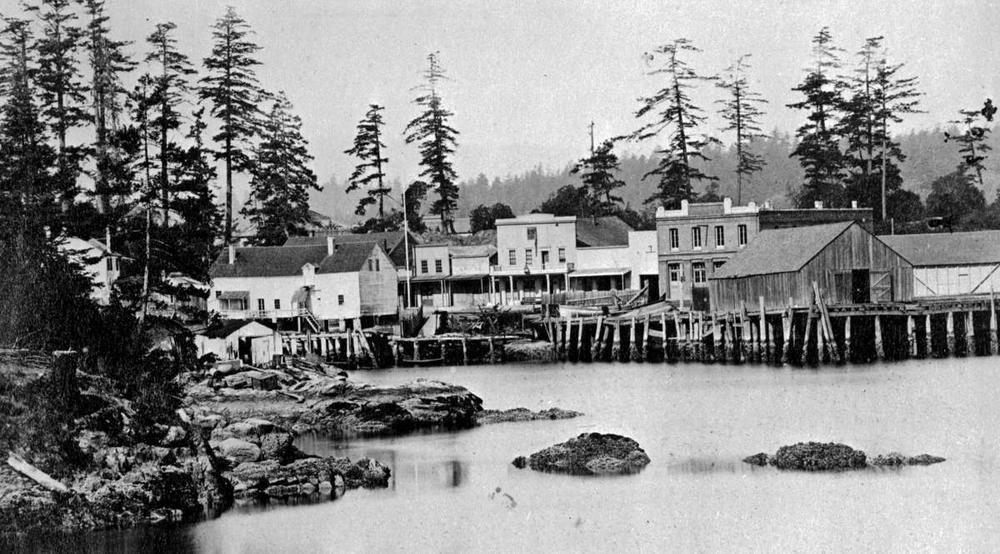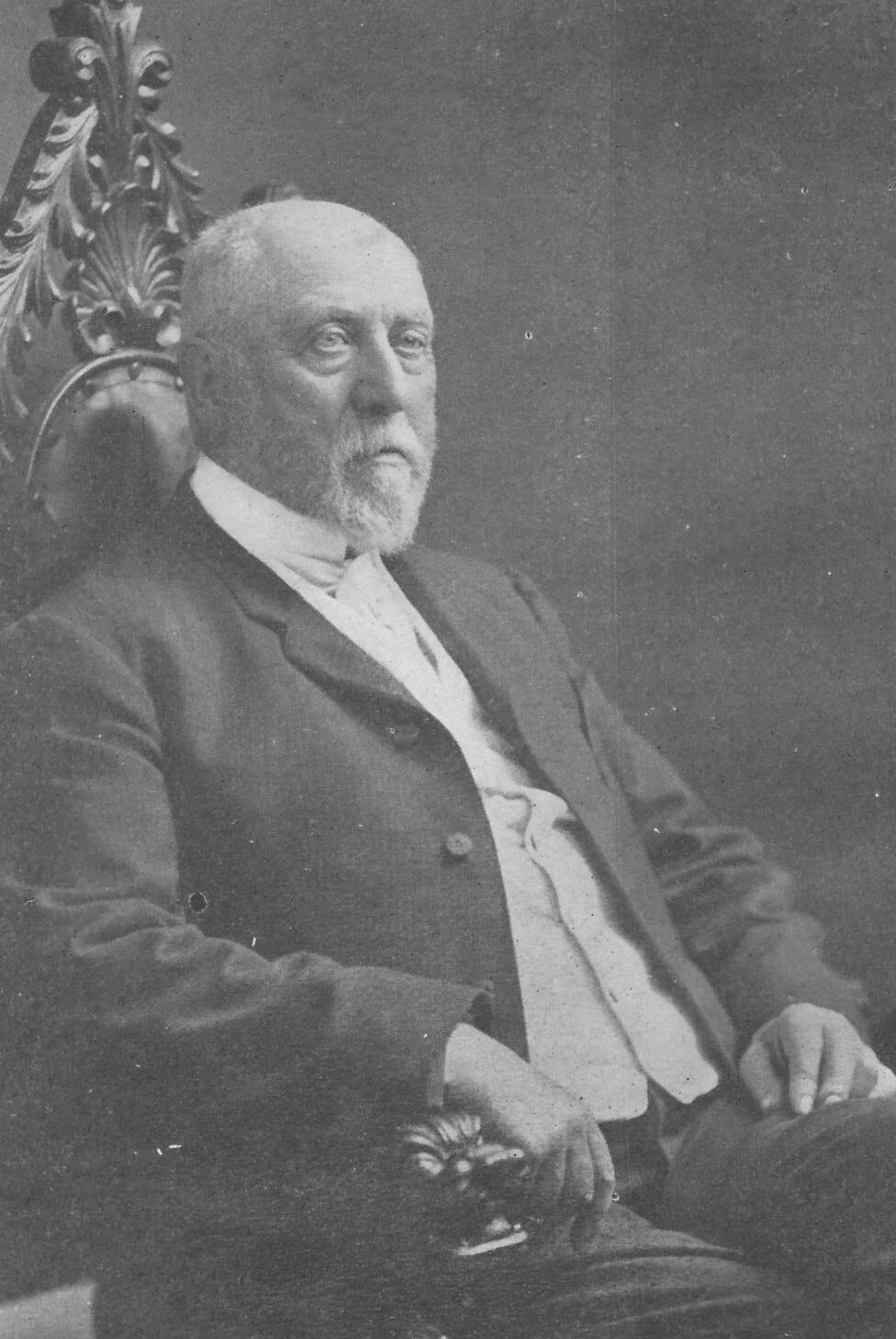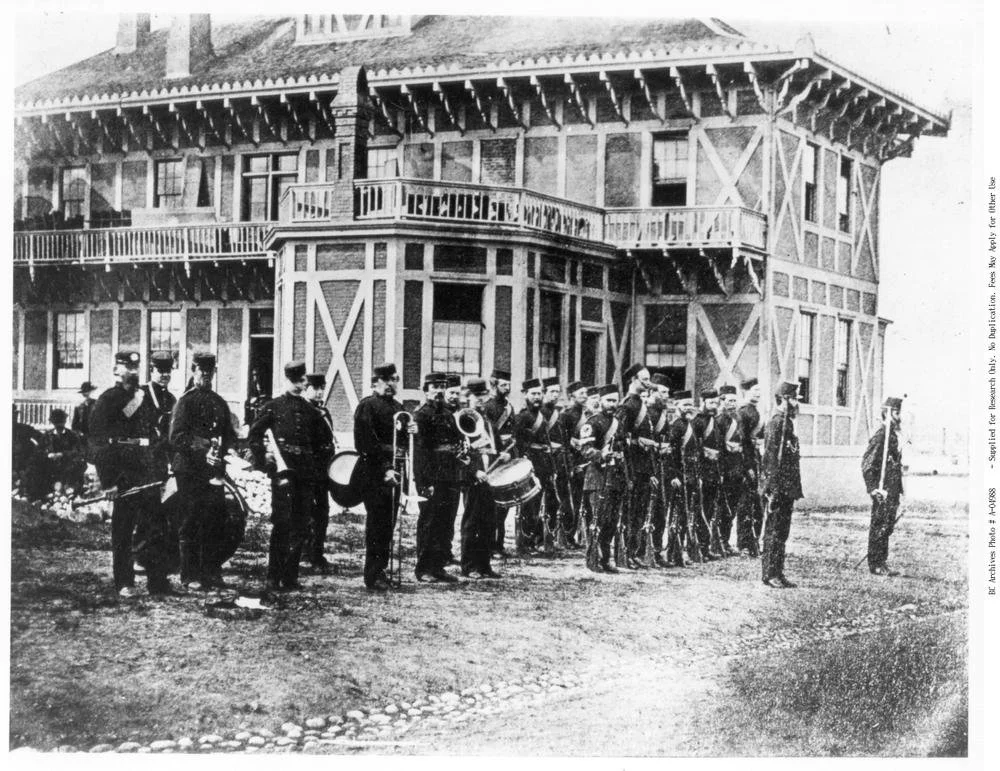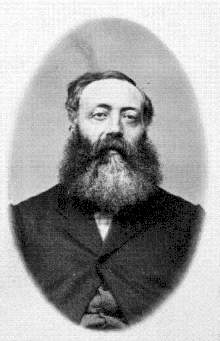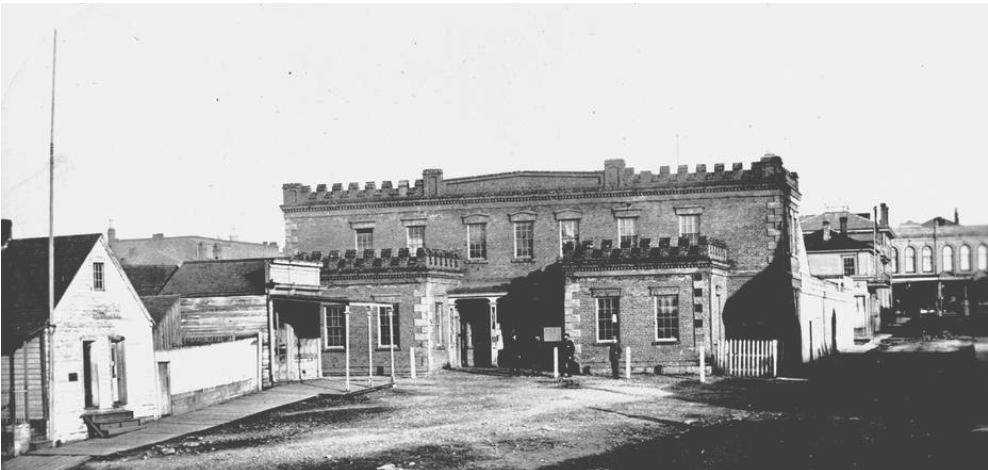Cold Christmas for Errant Colonial Treasurer
In the year and a-half since his arrival in Victoria, George Tomline Gordon had been appointed treasurer for the Crown Colony of Vancouver Island, elected the member for Esquimalt in the Legislative Assembly, and elected commanding officer of the No. 1 Company, Vancouver Island Volunteer Rifle Corps. He had a beautiful wife, a large, loving family and a fine farm.
Journalist and political enemy Amor de Cosmos soon found a way to get even for Gordon’s having beaten him at the polls. —BC Archives
But the knock on the door of Twin Oaks, the night before Christmas 1861, was not that of friends or carollers. It was Police Supt. Horace Smith with a warrant for Gordon's arrest.
When, minutes later, sleigh bells rang for George Gordon, they were on Smith's horse-drawn paddy wagon.
* * * * *
If the popular treasurer’s downfall came as a shock to his friends, his public appointments had been no surprise to those who thought they knew him. Both Mr. and Mrs. Gordon, it seems, were models of charm and deportment—“impossible to find manners more agreeable, and their particular style, the subdued and unpretending,” wrote Lieut. L.C. Hunt, stationed on San Juan island, to a friend in Maryland in April 1860.
Hunt seems to have been as much impressed by Mrs. Gordon as her husband: “She is charming—American in her delicate style of beauty—apparently 25, and yet the mother of how many children do you think? 11. Gordon is a very distinguished looking man, six foot three, and the pet of all who know him—as he was in England. This circumstance probably contributed materially to make him run through a large fortune at home, and so he emigrated to the El Dorado of British Columbia.
“A man of 40, he entered the office of his old Schoolfellow, Mr. H.P.P. Crease, and is preparing for admission to the Bar. In the meantime he ran 3 months ago for the Assembly and was elected... "
It hadn't been as easy as Hunt made it sound. In fact, Gordon's election had been quite complicated, with its roots in California, where William Alexander Smith, formerly of Nova Scotia, had had his name legally changed to Amor de Cosmos. Once in Victoria, the “lover of the universe” founded the British Colonist newspaper and became the spokesman for those opposed to the Hudson’s Bay Co. and the colonial establishment, both of which were personified by Chief Factor and later Governor James Douglas.
For his second bid for public office, de Cosmos chose to run in Esquimalt Town, this time against George Gordon who’d been appointed colonial treasurer. —BC Archives
De Cosmo lost his bid for the seat of Victoria Town in the Legislative Assembly in 1860, finishing in third place behind Attorney General George Hunter Cary and city auctioneer (and government candidate) Salem Franklin. In 1861, he tried to again, this time running in Esquimalt Town against Gordon who’d also been appointed Colonial Treasurer
If it strikes you as odd that he and Cary, both holding government appointments, could run for the Legislative Assembly, with Gordon an opponent of the government, well...that’s the way it was.
As you’re about to see, our first elections were conducted by something less than the Marquis of Queensbury rules!
As only property holders were enfranchised, there were just 26 potential voters. Gordon's past affair with a banker's wife, with the help of his muckraking political opponents, became a public sensation. But Gordon’s side satisfied themselves with claiming that Smith's non-de-plume, Amor de Cosmos, wasn’t legally recognized in the colony and therefore he should be required to use his own name.
After due consideration, de Cosmos’s campaign committee decided to play it safe by having him run as William Alexander Smith, “commonly known as Amor de Cosmos”.
“The day of the polling arrived,” retired journalist and politician D.W. Higgins wrote 40 years later, “and great was the excitement in the little town of Esquimalt.
Long afterwards, retired journalist D.W. Higgins recalled the exciting contest for Esquimalt Town. —BC Archives
“The fences and dead walls were profusely decorated with placards and posters, and the Reds(Gordon) and the Blues (de Cosmos) took possession of the village long before the polls opened at 10:00 in the morning. The saloons were wide open, and horses, buggies and express vans, and, on one occasion, a wheelbarrow, were used to take the electors to the polls...”
As there was no secret ballot, voters announced their choice. Several who’d previously declared their vote, only to change their mind at the poll, were bonneted—their hats pulled down over their eyes. Emotions ran so high that some electors took to the hills rather than give offence to either side. One man's wife, unhappy with his choice, hid his clothes.
“One would have thought that the fate of the British Empire depended upon the result of this election in outpost Esquimalt,” wrote Higgins.
At 3:00, with every available vote cast but one, Gordon and de Cosmos were tied at 10 each. In desperation, De Cosmos supporter Colonial Secretary C. B. Young charged off to Victoria in search of the last outstanding voter, James Moore. Ten minutes before the poll closed at four p.m., Young and Moore reined in their lathered horses before the polling station. It was obvious to all present that Moore had been dragooned and was disgruntled.
After proving his electoral qualifications and being asked for whom he voted, he said, Amor de Cosmos.
“Put that down, put that down, Mr. Sheriff!” cried an elated Gordon, who began leaping up and down, his beard shaking in his excitement.
“No, no,” said Young, “he meant ‘William Alexander Smith, commonly known as Amor de Cosmos,’ didn't you, Moore?”
Moore’s stammered acquiescence wasn't enough for Sheriff Naylor who recorded the vote for Amor de Cosmos and gave the official standings as William Alexander Smith, commonly known as Amor de Cosmos 10, George Tomline Gordon 10, Amor de Cosmos one. He then cast the deciding ballot as returning officer in favour of Gordon. The de Cosmos camp protested but Gordon assumed his legislative seat.
The scandal in Gordon's past life that his political opponents had dug up was a rumour that he'd run off to the Continent with the wife of a London banker but had been taken back by his wife. Lieut. Hunt revealed greater detail in a letter to his friend, writing that Gordon had been relentlessly pursued by the other woman, who was a “bosom friend” of his wife.
“Final result, a surprise, discovery, the rejection of the wife by the [other] husband, her appeals to Gordon, who met her at the Railway with the intention simply of seeing her established in London, which ended in her complete possession of him.
“Finally, after many months, Mrs. Gordon, against the advice and wishes of her family, follows him up, and reclaims him—Qu’en penses vous? They seem to be very happy at present.”
Patriotism was as much about pomp and ceremony and personal vanity as it was about war, and the Royal Volunteer Rifle Corps was a perfect fit for a social climber like George Gordon. —BC Archives
And successful, as demonstrated by his election as member for Esquimalt and as commanding officer of the Royal Volunteer Rifle Corps. His appointment as treasurer for the colony had been made despite the popular belief that he’d squandered a family fortune in the Old Country. Perhaps more surprisingly, no one seems to have wondered how Gordon could buy Twin Oaks Farm for the significant sum of $10,000 on his civil servant’s pay and legislator’s stipend.
As pure luck would have it, there was no Queen’s Printer both in those days, all government printing being done by the Colonist. Thus it came to the attention of de Cosmos, publisher—and defeated candidate for Esquimalt—that the Treasury had ordered new receipts which, contrary to the norm, were to be neither numbered nor bound.
This was by no means evidence of any wrongdoing. but it aroused de Cosmos’s curiosity and, seeing an opportunity for revenge, he embarked upon a week's-long campaign of editorial insinuation that bordered on assassination.
He challenged Gordon's appointment as Treasurer as “a crazy appointment” because he had no previous experience and had shown no aptitude for the position, and hinted that he’d been appointed to the position because of unstated, probably underhanded, services for his superiors.
Finally, after regurgitating Gordon's old affair with the banker's wife, de Cosmos demanded an audit of the Colony’s books.
Consequently, there was “a great commotion,” wrote Higgins, when, six months after his election, Robert Ker, Colonial Auditor-General, “discovered a heavy shortage in Gordon's accounts”. Arrested, indicted and arraigned before Chief Justice David Cameron, he was held in custody. Attorney General George Hunter Cary conducted the prosecution, two of the city’s leading barristers, D. Babbington Ring and H.P.P. (later Sir Henry) Crease, the defence.
Henry Crease, who’d gone to school with Gordon in the Old Country, had welcomed him into his practice in Victoria, only to find himself defending Gordon in criminal court. —Wikipedia
A first trial ended with a hung jury, as did the second. No sooner was Gordon released until a new trial could be arranged, than he was re-arrested. His enemies, taking no chances that he might flee, had ingeniously had him charged with owing money to the Crown, which meant Debtors Prison until he could be discharged under the Bankruptcy Act.
He cooled his heels in the castellated Bastion Square Police Barracks for a month before taking his leave.
Victoria’s Bastion Square Police Barracks, which doubled as the jail, looks strong enough but it couldn’t keep the colony’s errant treasurer from escaping. —BC Archives
Obviously, he still had friends, having apparently opened his cell with a duplicate key. By the time guards noticed his disappearance, six hours later, he was well on his way to Puget Sound in a small boat which, too, likely had been arranged.
He soon turned up in San Francisco, well-dressed and apparently solvent. In response to a rumour that the errant treasurer was off to join the Union Army, then fighting the Confederacy, his nemesis Amor de Cosmo had the last word on George Tomline Gordon:
“If [General] McClellan knows what he’s doing, he won’t have Gordon as a rear rank private!”


